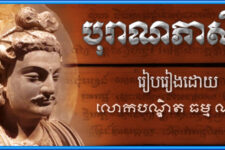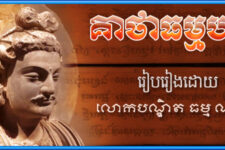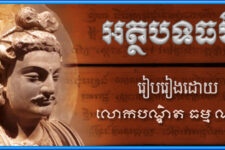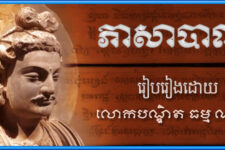ពុទ្ធវចនៈក្នុងធម្មបទ គាថាទី ១៨
អ្នកប្រកបកុសលកម្ម នឹងត្រេកអរជានិច្ច
HAPPY ARE THE RIGHTEOUS
ဣဓ နန္ဒတိ ပေစ္စ နန္ဒတိ၊ ကတပုညော ဥဘယတ္ထ နန္ဒတိ။
‘‘ပုညံ မေ ကတ’’န္တိ နန္ဒတိ၊ ဘိယ္ယော နန္ဒတိ သုဂ္ဂတိံ ဂတော။
ឥធ នន្ទតិ បេច្ច នន្ទតិ, កតបុញ្ញោ ឧភយត្ថ នន្ទតិ;
‘‘បុញ្ញំ មេ កត’’ន្តិ នន្ទតិ, ភិយ្យោ នន្ទតិ សុគ្គតិំ គតោ។
បុគ្គលអ្នកធ្វើបុណ្យទុក រមែងត្រេកអរក្នុងលោកនេះនិងលោកខាងមុខ រមែងត្រេកអរក្នុងលោកទាំងពីរ គេរមែងត្រេកអរថា ខ្លួនបានធ្វើបុណ្យទុកហើយ លុះធ្វើមរណកាលទៅកាន់សុគតិភព ក៏រឹងរឹតតែត្រេកអរក្រៃលែង ។
Idha nandati pecca nandati, katapuñño ubhayattha nandati;
‘‘Puññaṃ me kata’’nti nandati, bhiyyo nandati suggatiṃ gato.
Here he is happy, hereafter he is happy. In both states the well-doer is happy. “Good have I done” (thinking thus), he is happy. Furthermore, is he happy, having gone to a blissful state.
——————————————-
Story: រឿងនាងសុមនាទេវី
Sumanā, the youngest daughter of Anāthapiṇḍika, the chief supporter of the Buddha, lying on her death-bed, addressed her father as “younger brother” and passed away peacefully. The father was grieved to hear his devout daughter utter such innocent words at the moment of death. When he mentioned this matter to the Buddha, He explained that she addressed him thus because she had attained the second stage of Sainthood –Sakadāgāmī (once-Returner) while the father had attained only the first stage Sotāpatti (Stream-Winner).
———————————–
Source: Dhammapada: yamaka vagga;
translated with brief stories by Nārada Thera (2522-1978)
ប្រែពីបាឡីជាភាសាខ្មែរដោយ តាអារាមប៊យ ៣០.៧.២០១៩


🔸កំណែចុងក្រោយ Last Updated on February 24, 2025 by Johnny ចន្នី



